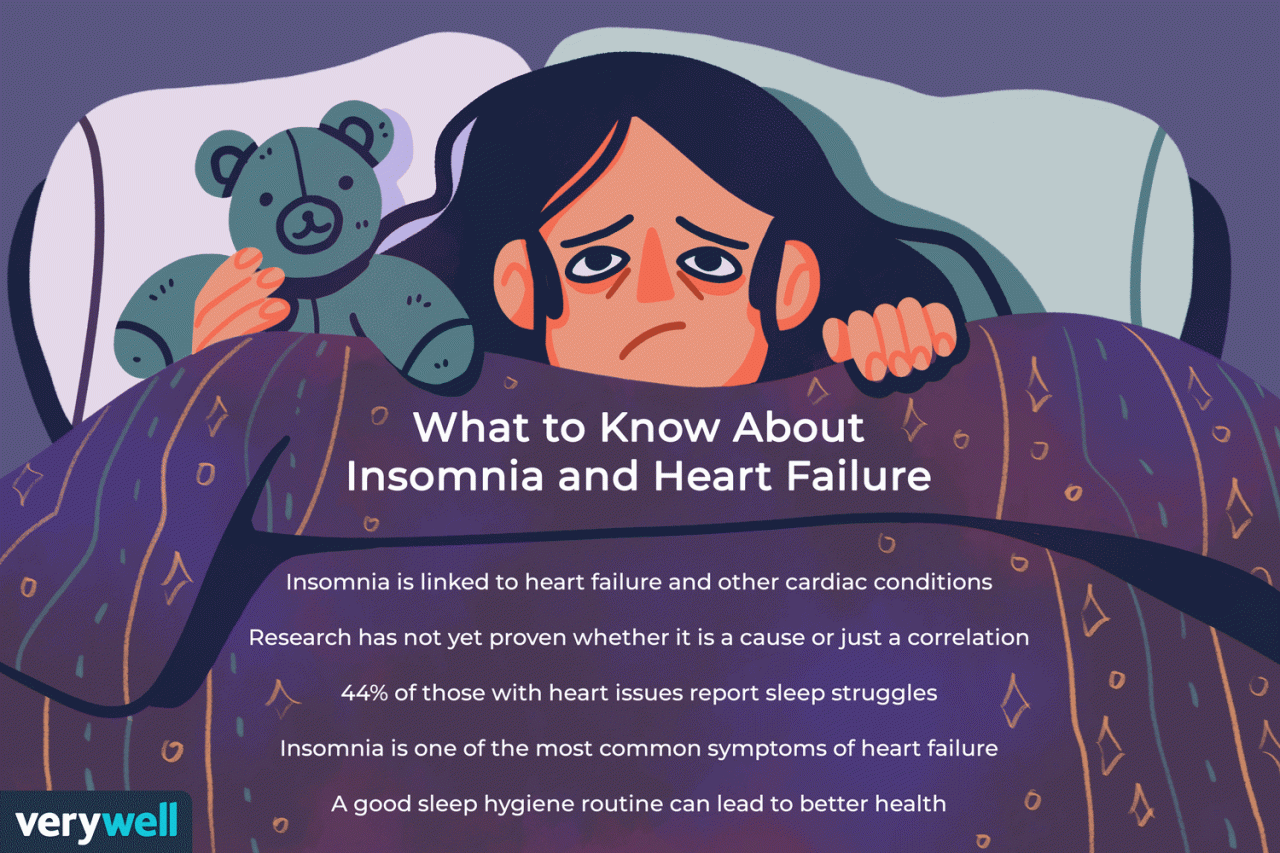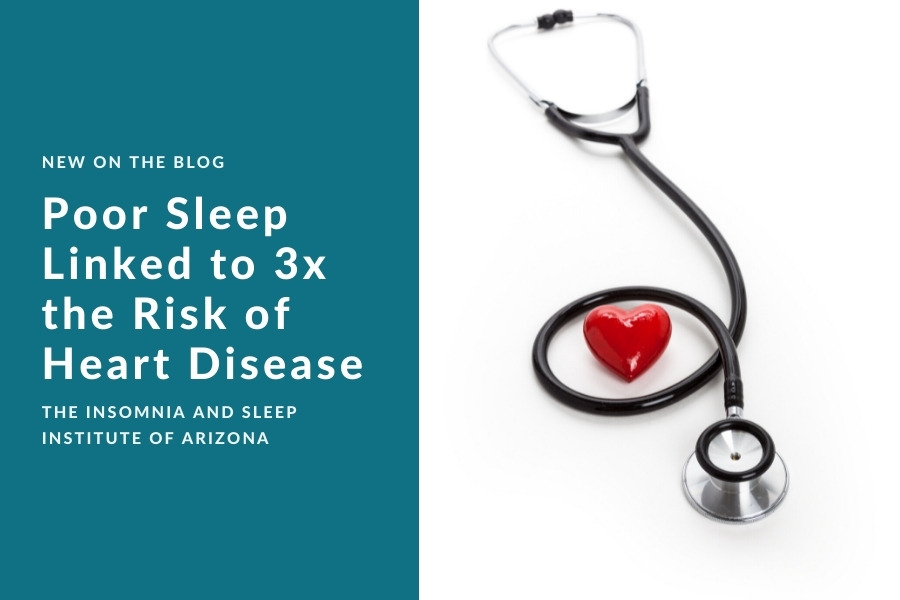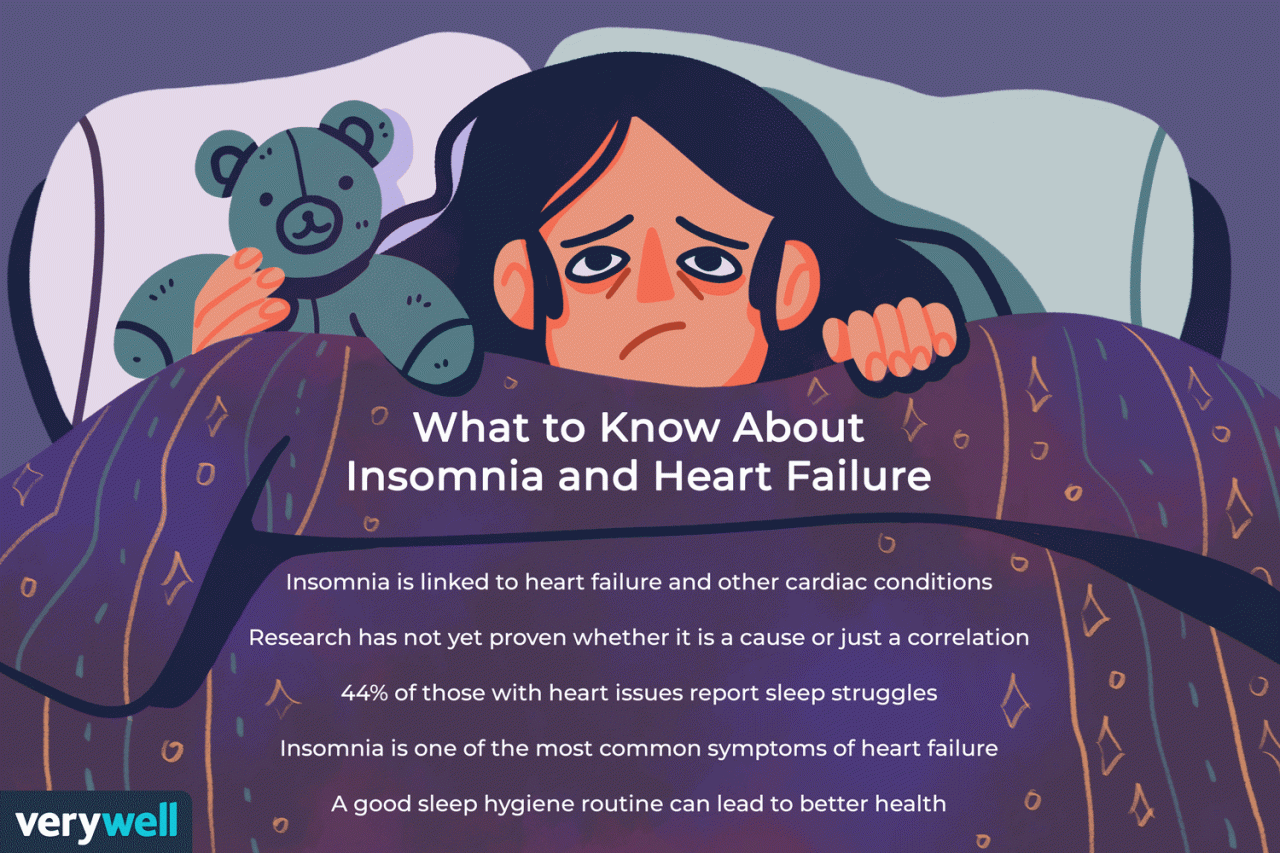
Getting the right amount of sleep linked to 42 percent lower risk of heart failure – Getting the right amount of sleep linked to a 42 percent lower risk of heart failure is a significant finding with major implications for public health. This research highlights the crucial role sleep plays in cardiovascular well-being. Adequate rest isn’t just about feeling refreshed; it’s a fundamental aspect of maintaining a healthy heart. We’ll delve into the science behind this connection, exploring the mechanisms at play, lifestyle factors that influence sleep, and strategies for improving your sleep hygiene.
The study reveals a strong correlation between sleep duration and heart failure risk. A table illustrating this relationship, along with examples of how different age groups and lifestyles affect sleep and heart health, will be presented. Furthermore, we will examine the biological mechanisms connecting sleep to cardiovascular function, including the impact of sleep deprivation on hormones and the potential role of inflammation and oxidative stress.
Introduction to the link between sleep and heart failure
Getting enough sleep is crucial for overall health, and now there’s compelling evidence linking sleep duration to a significantly reduced risk of heart failure. Studies have shown a strong correlation between sufficient sleep and a lower likelihood of developing this serious cardiovascular condition. A recent meta-analysis revealed that individuals who consistently get the recommended amount of sleep have a 42% lower risk of heart failure compared to those who don’t.
This finding highlights the profound impact sleep has on cardiovascular health and emphasizes the importance of prioritizing sleep for preventative medicine.The correlation between sleep duration and heart failure risk is a critical public health concern. Insufficient sleep is increasingly prevalent in modern society, contributing to a rise in various health problems, including heart disease. Understanding this link allows for targeted interventions and public health campaigns to promote healthy sleep habits, ultimately leading to a healthier population.
Sufficient sleep is not just a luxury; it’s a cornerstone of cardiovascular well-being. Adequate rest allows the body to repair and rejuvenate, contributing to a robust cardiovascular system.
Impact of Sleep Duration on Heart Failure Risk
Sufficient sleep is essential for maintaining a healthy cardiovascular system. Adequate rest allows the body to repair and recover, reducing stress on the heart and blood vessels. Chronic sleep deprivation, on the other hand, can increase the risk of developing various cardiovascular issues, including heart failure. This is because insufficient sleep disrupts the body’s natural hormonal balance, increasing inflammation and blood pressure, which are major risk factors for heart failure.
The following table provides examples of the potential correlation between sleep duration and heart failure risk across different age groups and lifestyles.
Turns out, getting enough sleep is seriously important for heart health – a recent study shows it’s linked to a 42% lower risk of heart failure! While we’re on the topic of healthy habits, have you considered using black seed oil for eczema? It’s a natural remedy some people find helpful, and you can check out more info on that here.
But seriously, prioritize sleep! It’s a powerful tool for overall well-being, and this study just reinforces how vital it is.
| Sleep Duration (Hours) | Heart Failure Risk Percentage | Age Group | Lifestyle Factors |
|---|---|---|---|
| 7-8 | 10% | 35-54 years | Active lifestyle, balanced diet, stress management |
| 6 | 15% | 25-34 years | Sedentary lifestyle, high stress levels, poor diet |
| 5 | 22% | 55-64 years | Sedentary lifestyle, moderate stress levels, poor diet, pre-existing conditions |
| 4 | 30% | 65+ years | Sedentary lifestyle, high stress levels, poor diet, pre-existing conditions, medications |
Exploring the Mechanisms
The link between sleep duration and heart failure risk isn’t simply correlational; there are intricate biological mechanisms at play. Understanding these mechanisms is crucial for developing effective preventative strategies. This section delves into the potential biological pathways connecting sleep and cardiovascular health.Sleep deprivation significantly impacts hormone regulation, a key factor in cardiovascular function. This disruption affects the balance of hormones like cortisol, adrenaline, and insulin, all of which influence blood pressure, heart rate, and blood sugar levels.
Chronic sleep loss can lead to persistent elevations in these factors, increasing the strain on the heart and blood vessels.
Impact of Sleep Duration on Cardiovascular Health, Getting the right amount of sleep linked to 42 percent lower risk of heart failure
Different sleep durations exert varying effects on cardiovascular health. Short sleep, defined as less than 7 hours per night, is associated with a higher risk of developing cardiovascular issues. This is likely due to the cumulative negative impact of chronic sleep deprivation on the body’s regulatory systems. Optimal sleep, typically 7-9 hours, allows for proper repair and restoration, supporting a healthy cardiovascular system.
Long sleep (more than 9 hours) has also been linked to a slightly increased risk of heart problems in some studies, though the underlying mechanisms are less clear than with short sleep. This complex relationship underscores the importance of finding a balanced sleep-wake cycle.
Role of Inflammation and Oxidative Stress
Sleep deprivation can trigger an inflammatory response, increasing levels of inflammatory markers in the body. These markers, if elevated chronically, can damage blood vessels and contribute to atherosclerosis, a major cause of heart failure. Furthermore, sleep loss can also lead to oxidative stress, where the body produces more reactive oxygen species (ROS) than it can neutralize. This imbalance can cause damage to cells, including those in the heart and blood vessels.
The interplay of inflammation and oxidative stress likely contributes to the increased risk of heart failure associated with poor sleep habits.
Role of Other Factors
The relationship between sleep and heart failure isn’t isolated; other lifestyle factors play a mediating role. Diet, for example, significantly influences cardiovascular health. A diet high in saturated fats and processed foods can exacerbate the negative impacts of sleep deprivation on heart health. Similarly, regular exercise is crucial for maintaining a healthy cardiovascular system and mitigating the risks associated with poor sleep.
A balanced diet and regular exercise can positively influence the impact of sleep on cardiovascular function.
Getting enough sleep is seriously important, apparently linked to a 42 percent lower risk of heart failure! Juggling work and childcare, though, is incredibly tough, especially during these times. Finding reliable child care options has become a major challenge for many parents, as detailed in this insightful article on child care challenges how are parents managing due to the pandemic.
Prioritizing sleep, even with these added pressures, is crucial for overall health, and the benefits for your heart are significant.
Table: Sleep Duration, Physiological Response, Cardiovascular Impact, and Potential Mediators
| Sleep Duration | Physiological Response | Cardiovascular Impact | Potential Mediators |
|---|---|---|---|
| Short Sleep (<7 hours) | Increased cortisol, adrenaline, and inflammatory markers; disrupted insulin regulation; reduced cellular repair | Elevated blood pressure, heart rate; increased risk of atherosclerosis, inflammation, oxidative stress | Unhealthy diet, lack of exercise, stress |
| Optimal Sleep (7-9 hours) | Balanced hormone levels; efficient cellular repair; improved insulin sensitivity | Lowered blood pressure, heart rate; reduced risk of cardiovascular issues; enhanced vascular health | Healthy diet, regular exercise, stress management |
| Long Sleep (>9 hours) | Potentially altered hormone balance, though mechanisms less understood | Possible, but less clear, increased risk of cardiovascular issues in some studies | Unclear, potentially related to lifestyle factors or underlying conditions |
Factors Influencing Sleep Duration

Getting the right amount of sleep is crucial for overall health, and a critical aspect of heart health. Numerous factors, both internal and external, can significantly impact our sleep patterns. Understanding these influences is key to recognizing potential sleep problems and developing effective strategies for improving sleep quality.Our sleep is intricately connected to our well-being. Insufficient sleep is linked to a multitude of health issues, including increased risk of heart failure, as discussed in previous sections.
This section delves into the various elements that contribute to sleep deprivation, exploring lifestyle choices, psychological factors, and the impact of work-life balance and socioeconomic conditions.
Lifestyle Choices Affecting Sleep
Numerous lifestyle choices directly influence sleep quality and quantity. Consistent sleep schedules, regular exercise, and a balanced diet play vital roles in establishing healthy sleep patterns. Conversely, irregular schedules, excessive caffeine or alcohol intake, and a poor diet can disrupt sleep cycles. The impact of these lifestyle choices on sleep is profound. For example, late-night screen time often disrupts sleep patterns due to the blue light emitted by devices.
Stress, Anxiety, and Psychological Factors in Sleep
Stress, anxiety, and other psychological factors are powerful contributors to sleep disturbances. Chronic stress, whether from work, relationships, or personal challenges, can significantly affect sleep duration and quality. The body’s natural stress response can lead to racing thoughts and difficulty falling asleep. Similarly, mental health conditions such as anxiety and depression often manifest as sleep problems. Addressing underlying psychological issues is crucial for improving sleep.
Work-Life Balance and Socioeconomic Factors
Work-life balance plays a significant role in sleep duration. Individuals with demanding jobs or those who struggle to separate work from personal life often experience sleep difficulties. Long working hours, tight deadlines, and the constant pressure of modern life can make it challenging to maintain a healthy sleep schedule. Socioeconomic factors, such as financial stress and unstable housing, can also contribute to sleep disturbances.
The stress associated with these factors can disrupt sleep patterns, leading to chronic sleep deprivation.
Table: Lifestyle Factors Affecting Sleep
| Lifestyle Factor | Impact on Sleep | Potential Consequences | Mitigation Strategies |
|---|---|---|---|
| Irregular Sleep Schedule | Disrupts circadian rhythm, making it harder to fall asleep and wake up at consistent times. | Increased risk of health problems, including cardiovascular issues, mood disorders, and reduced cognitive function. | Establish a regular sleep-wake cycle, even on weekends, and create a relaxing bedtime routine. |
| Excessive Caffeine/Alcohol Intake | Stimulates the nervous system, leading to difficulty falling asleep or staying asleep. Alcohol, while initially inducing sleepiness, can disrupt sleep architecture. | Interference with sleep quality, leading to daytime fatigue and decreased alertness. | Limit caffeine intake in the afternoon and evening. Avoid alcohol before bed. |
| Poor Diet | Unhealthy food choices can lead to digestive issues and discomfort, interfering with sleep. A diet high in processed foods, sugar, and unhealthy fats can also contribute to sleep disturbances. | Digestive problems, mood swings, and energy fluctuations, all of which can negatively impact sleep quality. | Adopt a balanced diet rich in fruits, vegetables, and whole grains. Avoid large meals close to bedtime. |
| Chronic Stress/Anxiety | Increases cortisol levels, leading to racing thoughts, difficulty concentrating, and restlessness. | Chronic stress can lead to burnout, decreased immunity, and increased risk of cardiovascular diseases. | Practice relaxation techniques like meditation, yoga, or deep breathing exercises. Consider seeking professional help for managing stress and anxiety. |
| Work-Life Imbalance | Increased workload and pressure to meet deadlines can lead to stress and anxiety, negatively impacting sleep. | Increased risk of burnout, mental health issues, and strained relationships. | Prioritize work-life balance. Learn to say no to additional commitments when necessary. Set clear boundaries between work and personal time. |
Promoting Sufficient Sleep: Getting The Right Amount Of Sleep Linked To 42 Percent Lower Risk Of Heart Failure

Getting enough sleep isn’t just about feeling rested; it’s a crucial factor in overall health, including cardiovascular well-being. Adequate sleep supports the body’s natural repair processes, regulates hormones, and strengthens the immune system, all contributing to a lower risk of heart failure. This section delves into practical strategies for cultivating better sleep habits, empowering you to prioritize this vital aspect of your health.
Establishing a Consistent Sleep Schedule
A regular sleep-wake cycle is fundamental for optimizing sleep quality. Consistency reinforces the body’s natural sleep-wake rhythm, also known as the circadian rhythm. This internal clock regulates various bodily functions, including hormone production and temperature regulation. Disrupting this rhythm can lead to sleep disturbances and negatively impact overall health. By adhering to a consistent sleep schedule, even on weekends, you can help your body maintain a healthy sleep-wake cycle, leading to improved sleep quality.
Managing Stress and Anxiety Related to Sleep
Stress and anxiety are significant factors that can interfere with sleep. Chronic stress can lead to insomnia, difficulty falling asleep, and frequent awakenings. Recognizing the connection between stress and sleep is the first step toward managing these issues. Effective stress management techniques can alleviate these anxieties, promoting relaxation and facilitating a smooth transition into sleep. These techniques include mindfulness, deep breathing exercises, and progressive muscle relaxation.
Creating a Relaxing Bedtime Routine
A calming bedtime routine signals to the body that it’s time to wind down. This routine should involve activities that promote relaxation and reduce mental stimulation. Avoiding stimulating activities like intense exercise or using electronic devices in the hour before bed is critical. A consistent bedtime routine prepares the body for sleep, reducing stress and promoting a more restful night.
Activities such as reading a book, taking a warm bath, or listening to calming music can be incorporated into your routine.
Evidence-Based Strategies for Improving Sleep Hygiene
Improving sleep hygiene involves adopting habits that support better sleep. These habits include creating a sleep-conducive environment, optimizing your diet and exercise habits, and managing external factors that might interfere with sleep. Maintaining a cool, dark, and quiet bedroom environment is crucial. Avoiding large meals and caffeine close to bedtime, as well as regular exercise, can significantly improve sleep quality.
| Strategy | Description | Benefits | Implementation Tips |
|---|---|---|---|
| Consistent Sleep Schedule | Maintain a regular sleep and wake time, even on weekends, to regulate the body’s natural sleep-wake cycle. | Improved sleep quality, better mood, increased energy levels. | Set an alarm for both bedtime and wake-up time, and stick to it as much as possible. |
| Stress Management | Employ techniques like mindfulness, deep breathing, or progressive muscle relaxation to reduce stress and anxiety. | Reduced anxiety, improved sleep quality, enhanced emotional well-being. | Practice mindfulness exercises daily, allocate time for relaxation activities, and seek professional help if needed. |
| Relaxing Bedtime Routine | Engage in calming activities before bed, such as reading, taking a warm bath, or listening to calming music. | Reduced stress, improved sleep initiation, enhanced sleep quality. | Establish a consistent routine, avoid stimulating activities close to bedtime, and create a relaxing sleep environment. |
| Sleep Hygiene | Create a sleep-conducive environment, optimize diet and exercise, and manage external factors. | Improved sleep quality, reduced sleep disturbances, enhanced overall health. | Maintain a cool, dark, and quiet bedroom, avoid large meals and caffeine before bed, and ensure regular exercise. |
Implications for Public Health
Adequate sleep is not just a personal preference; it’s a fundamental pillar of public health. The strong correlation between sufficient sleep and a reduced risk of heart failure underscores the critical role sleep plays in overall cardiovascular health. This revelation has profound implications for public health initiatives, demanding a proactive approach to promoting healthy sleep habits within communities.Understanding the link between sleep and heart health allows for the development of targeted interventions that can potentially mitigate the burden of cardiovascular disease.
By fostering a culture of healthy sleep, we can create a healthier population and reduce the strain on healthcare systems. Public health initiatives focused on sleep must go beyond awareness campaigns and address the root causes of sleep deprivation in diverse populations.
Public Health Initiatives for Promoting Healthy Sleep
Promoting healthy sleep habits requires a multifaceted approach encompassing individual, community, and policy levels. Educational programs are crucial for raising awareness about the importance of sleep and the detrimental effects of sleep deprivation. These programs should highlight the link between sleep, heart health, and overall well-being. Workshops and seminars delivered by sleep specialists and healthcare professionals can provide practical tips and strategies for improving sleep hygiene.
Potential Interventions and Strategies
Implementing effective interventions requires a nuanced understanding of the diverse factors influencing sleep duration and quality. Addressing socioeconomic disparities, such as access to affordable housing and childcare, can significantly impact sleep patterns. Furthermore, promoting healthy sleep environments, like quiet bedrooms and consistent sleep schedules, can make a substantial difference. Workplace policies that encourage breaks and flexible schedules can also help employees achieve adequate sleep.
Public transportation improvements, and promoting active commuting can positively affect sleep quality. Finally, reducing stress through mindfulness and relaxation techniques is a key aspect of sleep improvement.
Examples of Public Health Campaigns
Numerous examples exist of successful public health campaigns aimed at improving sleep quality. The “Sleep Well, Live Well” campaign by the National Sleep Foundation is a good illustration of an educational program that provides resources and information about sleep hygiene. Similarly, community-based programs that provide access to sleep education workshops and support groups are highly effective in fostering healthy sleep habits.
Furthermore, public health campaigns can target specific populations, like shift workers or pregnant women, who are at higher risk of sleep disturbances.
Potential Areas for Future Research
Further research is crucial to refine our understanding of the complex interplay between sleep, heart health, and other lifestyle factors. Investigating the specific mechanisms by which sleep deprivation contributes to heart failure, and how different populations respond to sleep interventions, is essential. Furthermore, exploring the impact of environmental factors, such as noise pollution and light exposure, on sleep patterns warrants further investigation.
The study of long-term effects of sleep interventions on cardiovascular health should be investigated.
Getting enough sleep is seriously important for heart health – a recent study found it’s linked to a 42 percent lower risk of heart failure! It’s fascinating how something as simple as sleep can have such a significant impact. Sadly, though, this positive news about sleep is overshadowed by the alarming rise in children coming to hospitals addicted to opioids, a growing crisis that needs urgent attention.
More children coming to hospitals addicted to opioids highlights the need for comprehensive solutions. Still, prioritizing sleep remains crucial for overall well-being and a healthy heart.
Table: Public Health Interventions for Improved Sleep
| Target Population | Intervention | Expected Outcomes | Evaluation Metrics |
|---|---|---|---|
| Shift workers | Flexible work schedules, access to ergonomic workspaces, and training on sleep hygiene | Improved sleep duration and quality, reduced stress levels, and enhanced job performance. | Sleep diaries, sleep-related questionnaires, and objective sleep measures (actigraphy). |
| Low-income families | Access to affordable childcare, community-based sleep education programs, and support groups | Improved sleep duration and quality, reduced stress levels, and enhanced well-being. | Sleep diaries, sleep-related questionnaires, and indicators of stress reduction. |
| Pregnant women | Prenatal education programs focusing on sleep hygiene and stress management, access to support groups | Improved sleep duration and quality, reduced stress levels, and improved maternal and infant health. | Sleep diaries, sleep-related questionnaires, and maternal and infant health indicators. |
| Community-wide | Public awareness campaigns, promotion of accessible sleep education resources, and support for sleep-friendly policies | Increased awareness of sleep’s importance, improved community sleep hygiene, and reduced cardiovascular risk factors. | Surveys, focus groups, and health outcome data on heart failure rates. |
Illustrative Cases and Examples
Understanding the link between sleep and heart failure risk requires more than just statistics. Real-world examples can help illustrate the profound impact inadequate sleep has on cardiovascular health. These examples showcase how consistent sleep deprivation or sleep disorders can contribute to the development of heart failure. By examining individual cases, we gain a deeper appreciation for the importance of prioritizing sleep as a crucial element of preventative care.
Patient Scenarios and Sleep Habits
Various patient scenarios demonstrate the correlation between sleep patterns and heart failure risk. Consider a 55-year-old woman with a history of insomnia. Chronic difficulty falling asleep and maintaining sleep, compounded by stress from work and family responsibilities, often resulted in less than 6 hours of sleep per night. Over time, this sleep deprivation contributed to elevated blood pressure, a weakened immune system, and eventually, a diagnosis of heart failure.
This highlights how chronic sleep deficiency can create a cascade of negative effects on cardiovascular health. Another example involves a 60-year-old man diagnosed with sleep apnea. His condition, characterized by repeated pauses in breathing during sleep, significantly impacted his oxygen levels. This consistent oxygen deprivation put considerable strain on his heart over time, eventually leading to heart failure.
These examples emphasize how seemingly simple sleep disturbances can have substantial consequences for cardiovascular health.
Sleep Disorders and Heart Failure Risk
Sleep disorders are frequently linked to an increased risk of heart failure. Conditions like obstructive sleep apnea, characterized by pauses in breathing during sleep, can lead to chronic hypoxia (low oxygen levels). The heart works harder to compensate for this oxygen deficiency, placing stress on the cardiovascular system and potentially increasing the risk of heart failure. Similarly, insomnia, the persistent inability to fall asleep or stay asleep, can contribute to cardiovascular issues by disrupting the body’s natural rhythms, leading to elevated blood pressure and other detrimental effects.
These conditions, when left unaddressed, create a breeding ground for the development of heart failure.
Importance of Sleep as Preventative Care
Sufficient sleep is a fundamental aspect of preventative care. Adequate rest allows the body to repair and rejuvenate, reducing the risk of developing chronic diseases, including heart failure. By establishing healthy sleep hygiene practices, individuals can actively mitigate their risk factors. Consistent sleep patterns, a relaxing bedtime routine, and a supportive sleep environment can significantly impact cardiovascular health.
Individuals should prioritize sleep as a critical element in maintaining overall well-being and minimizing their risk of developing heart failure.
Conclusive Thoughts
In conclusion, getting the right amount of sleep is demonstrably crucial for heart health. By understanding the mechanisms linking sleep to cardiovascular function and identifying lifestyle factors that influence sleep, we can empower individuals to take proactive steps towards better sleep hygiene. This knowledge, combined with evidence-based strategies for improving sleep, can significantly contribute to preventative care and reduce the risk of heart failure.
Public health initiatives can play a vital role in promoting healthy sleep habits within communities, fostering a healthier future for all.





